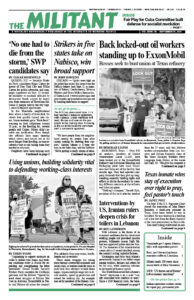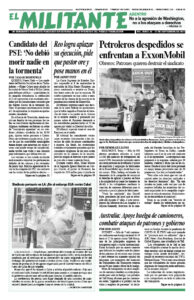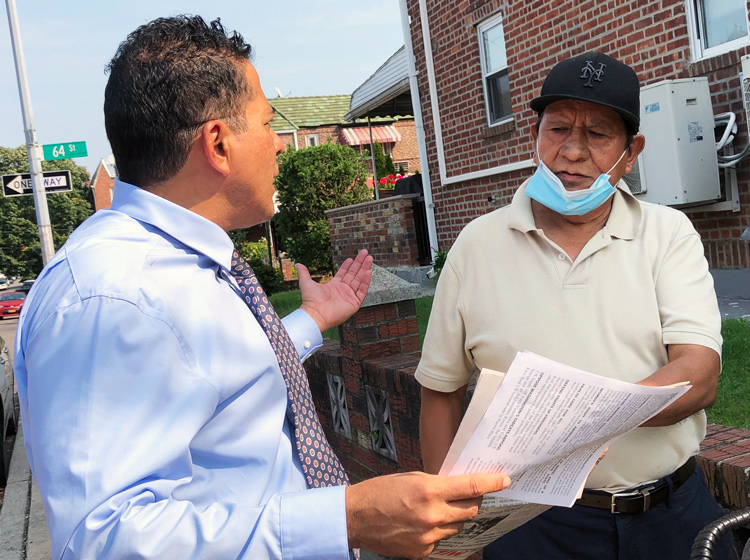QUEENS, N.Y. — Socialist Workers Party candidates Róger Calero for mayor of New York City and Willie Cotton for public advocate, and campaign supporters on Sept. 12 extended solidarity to residents affected by destructive floods caused by heavy rain from remnants of Hurricane Ida. Some 13 people died in the city Sept. 1, most in flooded apartments.
In the Woodside neighborhood here, where a family of three died, the streets had quickly turned into rivers. Some residents got a “flash flood” warning on their cellphones around 10 p.m., as the flooding hit, several people told Calero. Others didn’t receive any notification. Even though city officials have maps showing which streets and houses are in the most danger from flooding, no one received a visit or call telling them they needed to evacuate.
Neighbors have been helping each other clear damaged appliances and furniture from basements and ground-floor dwellings. Many were appreciative of the SWP campaign visit, in contrast with the stops by elected politicians — from President Joseph Biden to Mayor Bill de Blasio on down — which some described as self-serving “photo opportunities.”
“We’re a working-class party, independent of the Democrats and Republicans. They defend the interests of the capitalist rulers responsible for this disaster,” said Calero. “No one had to die!”
The ruling rich “take and they take,” Luis Rosas, a retired maintenance worker, told Calero, listing ways bosses squeeze working people. “I pay more for the dirty water than for the clean,” he said, referring to high sewer fees in his water bill. Motioning to the flood damage, he added, “And this is what we get in return.”
Rosas asked Calero, “Do you include immigrant workers in your campaign even if they can’t vote? They work here, live here, and pay taxes.” Calero pointed to the SWP campaign’s support for amnesty for all undocumented immigrants as a way to unite the working class. Rosas thought that was important, noting bosses use these divisions to “bring down the wages of all workers.”
“Thank god for the amnesty passed under Ronald Reagan,” he said, as he had been able to adjust his status in 1986. But, he added, “They did it because they needed us. They needed workers.”
Calero agreed, saying, “Both Democratic and Republican administrations regulate the flow of immigrant labor based on what the bosses need, or when they feel the pressure from massive struggles by working people. The fight for amnesty is a life-and-death question for the union movement.”
Willie Cotton and his supporters visited the Hollis neighborhood where Phamatee Ramskriet and her son, Krishah, drowned in a basement apartment.
The area has flooded for decades. The city has spent more than $24 million supposedly to fix the problem, but if anything, the “fix” has made it worse.
“I’ve sounded the alarm over and over to every government agency I can, and nothing happens,” Amrita Bhagwandin, who lives across the street from the Ramskriets, told Cotton. “There has to be accountability.” Bhagwandin’s basement and first floor flooded during the storm.
Many workers live in basement apartments because it is the only housing they can afford. And others rent out their basements because they need the income to be able to pay their mortgage.
“This is one of the many reasons why workers and our unions need to fight for a government-funded public works program to build decent, affordable housing and many other things we need,” Cotton said.
He said that in Cuba the government and mass organizations evacuate everyone who is in danger before hurricanes hit and then immediately organize volunteers to begin repairing any damage. That’s only possible because working people there “took power out of the hands of the capitalist class and made a socialist revolution.”
The SWP campaigners saw working people bringing cooked meals to those forced out of their homes, showing the power and potential for working-class solidarity. Many people here are originally from Guyana, the Philippines, Bangladesh, Colombia and other countries.
Brian Williams and Sarah Katz knocked on the door of Andy Sarbadhik while campaigning in Hollis. Three feet of water rushed into Sarbadhik’s basement, destroying everything. Originally from Guyana, he is a highway construction engineer.
“Water got into the foundation of the house,” he said. His insurance company initially said it’s not a flood zone so there’s no coverage. “Now they say they’ll look into it.”
He remembered Hurricane Sandy that devastated parts of the New York area in 2012. “I was little then,” Sarbadhik said, adding some people have still not been compensated or gotten the assistance needed to recover from the damage.
Sarbadhik eagerly bought the book Are They Rich Because They’re Smart? by SWP National Secretary Jack Barnes.
Campaigning in Beaumont, Texas
A team of SWP campaign supporters traveled to Beaumont in southeast Texas Sept. 10-11 to bring solidarity to the fight by United Steelworkers union members against bosses who locked them out at the ExxonMobil oil refinery there. (See article on front page.)
During their visit they met working people who had evacuated from Louisiana and were staying in Beaumont hotels.
“I was in New Orleans when Hurricane Ida hit,” 88-year-old Patricia Ryan told SWP campaigner Deborah Liatos. “I lost the shingles on my roof and my insurance company says I have to pay the first $8,000. I can’t afford that.”
Gabrielle Orcutt had left North Shore in Louisiana and was staying in Beaumont with her two children. “We rode out the storm but left three days later because we could not take the heat and lack of water and electricity,” she said.
Orcutt got a copy of the Militant from Liatos after seeing its coverage of the social catastrophe caused by the storm. It explains the disaster is a “result of the workings of capitalism and the class-divided realities it imposes on working people.” To join SWP or Communist League campaigning, or to subscribe to the Militant, contact distributors nearest you.


